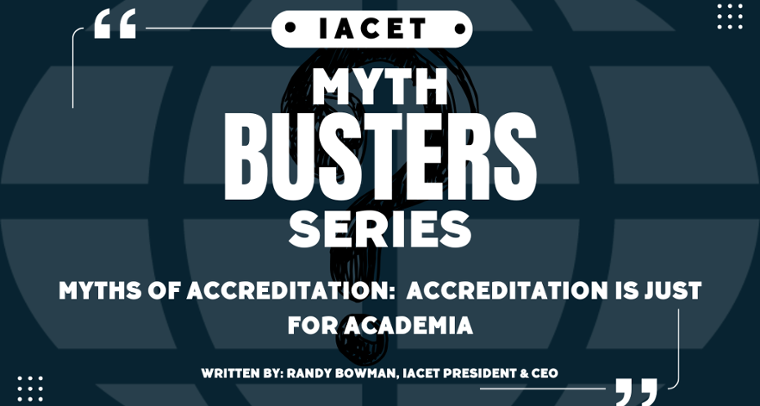Myths of Accreditation: Accreditation is just for Academia

Accreditation has long been associated with traditional academic institutions—universities, colleges, and schools. However, this perception is outdated and overlooks accreditation’s diverse and essential role across industries.
The notion that accreditation is solely about academic curriculum fails to recognize its broader applications in workforce development, corporate training, professional certification, and continuing education. Let’s explore why accreditation matters beyond academia and why organizations outside of traditional education should take it seriously.
Accreditation Extends Beyond Universities
While higher education institutions have historically been the most visible entities pursuing accreditation, many industries rely on accreditation to ensure quality, consistency, and credibility. Accreditation applies to:
- Corporate Training Programs: Businesses and organizations provide in-house training programs that require validation to ensure effectiveness and industry relevance.
- Professional Development & Certification Programs: Many professions require ongoing education to maintain licensure or certifications, and accredited training ensures adherence to recognized standards.
- Workforce Development Initiatives: Government and industry-led workforce training programs seek accreditation to demonstrate their alignment with skill and competency standards.
- Trade and Technical Schools: Non-traditional education pathways, such as vocational and technical training, benefit from accreditation to validate their curriculum.
Accreditation Ensures Quality, Not Just Curriculum
Another common misconception is that accreditation focuses purely on the academic curriculum. In reality, accreditation evaluates a variety of critical factors beyond just course content:
- Instructional Design and Delivery: Accreditation assesses how training is structured, ensuring instructional methods align with best practices for adult learning.
- Learner Assessment and Outcomes: Programs must demonstrate that they effectively measure learner progress and achievement of intended learning outcomes.
- Continuous Improvement and Compliance: Accredited organizations commit to ongoing evaluation and enhancement of their training programs to stay current and effective.
- Instructor Qualifications: Accreditation requires organizations to verify instructors and trainers possess the necessary expertise and credentials.
- Learner Support and Resources: Accreditation ensures learners have access to appropriate support services, materials, and learning tools.
Why Accreditation Matters for All Learning Providers
For organizations outside of academia, accreditation provides a powerful signal of credibility and excellence. It helps businesses and training providers:
- Establish Trust: Accredited programs are more likely to be recognized by employers, government agencies, and industry bodies as credible sources of training.
- Enhance Marketability: Accreditation differentiates organizations in competitive markets, attracting learners and business partners who seek quality training.
- Meet Regulatory and Industry Standards: Many industries have specific compliance requirements that accredited programs help fulfill.
- Improve Learning Effectiveness: Accreditation promotes a culture of continuous improvement, ensuring training remains effective and aligned with industry needs.
Breaking the Myth, Expanding the Possibilities
The idea that accreditation is only for universities is a limiting belief that ignores the transformative impact it can have on all types of learning organizations. Accreditation is a mark of excellence extending beyond academic institutions, benefiting corporate training programs, professional development initiatives, and workforce education efforts. By embracing accreditation, organizations can elevate their training programs, enhance credibility, and contribute to a more skilled and competent workforce.
It’s time to reframe the conversation around accreditation—recognizing it as a vital tool for ensuring quality learning experiences, regardless of where or how they take place.
About the Author

Randy is a seasoned executive leader currently serving as the President and CEO of IACET, a non-profit accrediting body in the continuing education and training sector. With a focus on strategic vision and operational excellence, he effectively leads the organization to achieve its mission and goals.
With over two decades of experience in various leadership roles, Randy has a proven track record of driving organizational success. His expertise lies in aligning technological solutions with strategic objectives, ensuring operational efficiency and sustainable growth.
